#but then there's the 'born different' and all the subtext that comes with that. like being a hunter is not something inherent
Text
shifter dean's monologue abt being human but born different and hated until he learned to be someone else. all while being linked to dean's psyche always gets me 😭😭😭 and in an episode where dean is saying one thing (it's better to be alone, isolated, not have friends bc hunters don't get to have that) while deep down wanting the opposite ("you got to go to college, have friends. you don't think i had dreams of my own") and his true feelings are only revealed by the shifter therefore. this whole monologue, like the one he gave to sam about his own dreams, absolutely can (and should!) be read as reflective of dean's feelings too and it just makes me sooo !!!
#and of course the obvious parallel is dean is a hunter. hunters are outsiders#he can never be his true self with others because they won't understand / hate him (like what happened with Cassie)#but then there's the 'born different' and all the subtext that comes with that. like being a hunter is not something inherent#but there are other things about dean that he keeps hidden#things about himself that he's been hated for or hated himself for and fought to accept#vic.txt#vics spn rewatch#spn 1x06
106 notes
·
View notes
Text
I find sukuna's enraged reaction to being pitied so interesting, considering that he, himself, admitted that he didn't expect that someone (or maybe just yuuji) offering him pity would anger him so much. honestly looking at all sukuna's interaction with other characters like jogo, yuuji, gojo... the contrast in how he talks about being strong and how he talks about being weak is quite striking.
despite having a huge superiority complex, he never gives any boasting comments about himself, like gojo for example. he even praises others, sorcerer and curses alike, for their strength, which again is contrary to gojo who often belittles and degrades his opponents. however, sukuna's behaviour is not actually opposite of gojo's, because while he admires others' strength, he finds being weak disgusting in itself. you see, gojo never had a problem with other people being weak because being weak is not something he could ever relate to like "yeah, those guys are weak but how is that my problem?". others being weak never really disgusted him, not like it does sukuna, but rather amused him (probably why he teased and bullied utahime and ichiji so much lol) anyway, my point is that, sukuna's attitude doesn't contrast gojo's, it mirrors it.
gojo's problem was that he was obsessed with being the strongest. he desperately wanted to live up to his title, but not because he had some deep-seated insecurity about being weak, but because that's all he's ever been. he wrapped his entire identity around it, which in result made him believe that he could only relate to people who were just as strong as him. then there is sukuna... who on the other hand... (dramatic pause)... is obsessed with being weak or rather he desperately doesn't want to be seen as someone who's weak. sukuna keeps insulting and belittling yuuji for being weak, despite yuuji CLEARLY not being weak. yuuji's own humanity and the strength he derives from it, exposes sukuna's own deep-seated weakness and dare I say... insecurity.
at the beginning of this post I said how sukuna has a big superiority complex, which now, after the recent canon events it almost borderlines with an inferiority complex. the thing is that, superiority complex and inferiority complex are kinda the same thing. they both stem from a deep-seated feeling of inadequacy, with the only difference being that someone with an inferiority complex tends to express these feelings as anxiety and submissiveness, whereas someone with a superiority complex overcompensates by acting as if they're god's gift to mankind, which is the later for both sukuna and gojo. however, unlike gojo, whose own superiority complex comes from the fact he was treated like a god by everyone in his clan since he was born, sukuna's superiority complex and its origins can still only be found in the subtext. we know that he was born an unwanted little wretch and people hated him, most likely feared him due to his own abnormal appearance and probably later his overwhelming strength. I don't want to dive too much into this since we don't actually know sukuna's backstory, we can only speculate based on what we know. however, it's his conversation with yuuji after he possessed megumi that interest me the most. he says...
Well, saying it from my perspective; why are all of you so weak. Why (are you) so obsessed over living despite being so weak
and let's not forget, sukuna is the only character who thinks yuuji is weak, which makes the rest of his speech all the more interesting, as he continues...
How can living things who keep collapsing easily say that they wish to be happy forever?
now this is funny, because several chapters later he admitted that no matter how many times he tries to break yuuji, he keeps getting back up, he's either contradicting himself again (and well.. he IS) or...
It’s better for all of you to spend your whole life crushing fitting misfortune for you
he's not only referring to yuuji here... sukuna genuinely believes that the weak should spend their whole lives chewing on their suffering, as is their natural state... but why?
after yuuji offered sukuna mercy, sukuna felt looked down upon and got down right pissed, which even shocked sukuna himself. why would that offend him? after all, he KNOWS he's strong not even gojo's taunts could get to him or yorozu trying to teach him about love, something he supposedly already knows about. why did yuuji offering him sympathy enraged him so much? shouldn't he just laugh in his face for believing he could beat him?? it seems like.. MAYBE.. in that moment, yuuji unintentionally touched on a very sore spot there, revealing sukuna's own insecurity: being seen as weak.
#god am I making sense? I'm yapping again and Im clearly not normal about sukuna#he's just so messy... I keep rotating him in my mind at all hrs of the day#this post is just me talking to myself btw#I just wanted to get this out of my head#ryomen sukuna#jjk 266#jjk leaks#should I tag gojo???...
120 notes
·
View notes
Text
F1 driver duos and the booktropes I associate with them
Max and checo: not a booktrope but you know those oscar bait movies about a person pursuing something to his own destruction being the best but also being doomed like I,Tonya yep those movies both of them are those movies
Lewis and george: gay book writen by a white woman who was raised on yaoi and tumblr shiping 2014, Its painfully British and might be a larry stylinson fanfic has a cute dog and the author is eventually canceled on Twitter for the age gap.
Carlos and Charles: not a book again but telenovela romantic pairs, Charles is the good boy the protagonist will end with carlos the second evil boyfriend who will eventually team up with the vilaness to break them apart.
Oscar and Lando: just heartstoper core mindless teen fluff who will win the GlAAD award of unburied happy coming of age gays
Lance and Fernando: all the daddy Dom mafia millionaire boss ceo booktok brainrot but somehow in both ends of the relationship.
Yuki and Daniel : like early 2010s young adult pre teen emotional coming if age Novel writen by someone trying so hard to be John green it will include some profound analysis about life and meaning tumblr would love for the quotable phrases then Hate it because they eventually realize the characters did some fucked up shit.
Bottass and Zhou: that one book your very obnoxious book friend will recommend saying it's very good but it's just a soft thriller from 1980 about a teenage boy obsessing and stalking his low key weird neighbor and about 300 pages of heavy handed love and murder metaphors involving deers bears and bunnies by the end you really don't understand what is about but the subtext it's actually good
Pierre and Ocon: both are secondary love interests on a book that once was a wattpad original they only exist so the actual main love interest looks good so they are an inch above absolutely dreadful still main love interest is so bad they are considered good by the haters.
Logan and Alex: both are wattpad Born lover boys in different books Logan it's the secondary love interest who was actually the good option but he is against a tatoo covered dark haired asshole so he loses meanwhile Alex is in those quirky mindless fluff books that it's almost all pining he id basically a manic pixie dream boy.
Hulkenberg and kmag: weird mommy erotica you will find in that old single aunt room about vikings and pirates or both hallmark style holydays books about finding love for the ripped blond lumberjack in a small town, or a gay erotica actually written by a gay man who skips the fluff and its mostly about hot ripped blondes getting down to business.
#formula 1#formula one fandom#max verstappen#checo perez#lewis hamilton#george russel#oscar piastri#lando norris#lance stroll#fernando alonso#yuki tsunoda#daniel ricciardo#esteban ocon#pierre gasly#logan sargeant#alex albon#nico hulkenberg#kevin magnussen
78 notes
·
View notes
Text
1: Magic is a Metaphor > 2: Morgana is a Lesbian > 3: Merlin is Gay > 4: Arthur is Bi
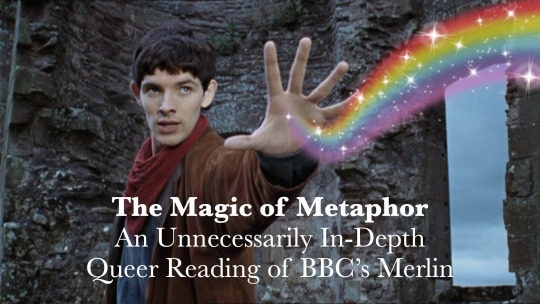
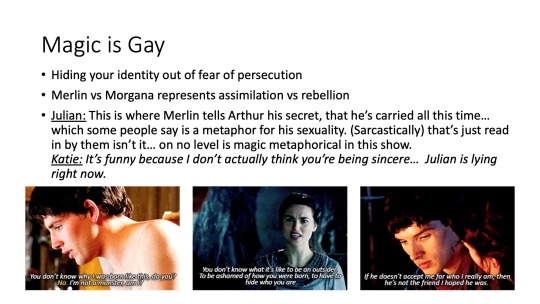
Obviously, magic is a metaphor for being gay. It is something that you're born with, that you can't change, but that you have to hide because the society around you won't accept you. Both Merlin and Morgana are always saying that they've been made to feel like a monster, an outsider, and they just want to be accepted for who they really are. And it's no coincidence that they are the most queer coded characters in the whole show.
But building off of that subtext, I think that you can read the different way that Merlin and Morgana go about trying to achieve equal rights as being an allegory for queer identity politics, where Merlin embodies this homonationalist assimilation strategy. He believes that if he stays closeted and conforms to the status quo, then eventually he will prove that sorcerers are good, moral, normal people and therefore worthy of rights. But over time, he internalises all of this shame and self-hatred and becomes increasingly obsessed with Arthur and dependent on his validation until he becomes complicit in his own oppression.
Meanwhile, Morgana represents a radical rebellion ideology. Even though she comes from a place of privilege, she quickly realises that she can't achieve meaningful change through constitutional methods and therefore resorts to violent protest. But her downfall is that she's more motivated by personal vengeance than a genuine desire for equality. So she creates a lot of infighting within the community by shunning anyone whose ideas aren't as extreme as her own, and she inadvertently confirms all of the negative stereotypes about 'angry witches' that she has been trying to fight against.
Obviously I don't think that all of this political commentary is intentional, but the basic idea of magic being gay is definitely intentional. As evidenced by this quote from the executive producer of the show, where he says very sarcastically, "some people say that (magic) is a metaphor for his sexuality, but that's just read in by them, isn't it? On no level is magic metaphorical in this show." And then Katie McGrath says, "it's funny because I don't actually think you're being sincere." And then she says directly to the audience, "Julian is lying right now."
#this is in response to @tundratoad asking to see my merlin presentation. this was actually the first thing I posted on this blog but the#slides don't mean much by themselves so I've added the accompanying commentary. which is all basically verbatim voice to text of a#tiktok I made about this presentation last year. I realise this is incredibly long in text form but I can't really be bothered editing it#and yes I could just post the actual tiktok video but it is cringe and I don't want my face on here. need that plausible deniability#so just take this for what it is i guess#merlin#bbc merlin#merlin meta#morgana pendragon#merthur#morgwen#the magic of metaphor
121 notes
·
View notes
Text
Safety and Frogs
AO3 Link
Malon hums to herself, combing her fingers through fluffy brown hair. The screen door to the house swings open; squeaking on the hinges. She should oil it later.
“Got room for one more?”
“For you Fairy Boy? Always.” She smiles up at her husband as he settles onto the wide porch swing on her free side.
“How’s Hyrule?”
“Ran out of energy helping with the fairies. Now we’re both enjoying a nice break.” At her side, the traveler is fast asleep against her shoulder. She’s eased Link to sleep with the same gesture many a time.
“Well, I think I could do with some rest myself.”
“Finished with the horses?”
“The boys are still moving grain. Wild is…helping.” Causing chaos, comes the subtext.
“And Wind?”
“…hm.”
So, instigating said chaos. Well, as long as they don’t set the barn on fire. Link sets the porch swing rocking with a foot and she leans into his side. Even after 10 years of marriage, her favorite place is next to him. They’ve been together long enough that they can be apart, but it will never be her choice.
Link is…different, the more time he spends with the boys. Oh, sure, he’s changed a lot from the young boy who wandered out of the forest. Even more so since they started dating or got married. Those were drastic changes, borne out of struggles and pain.
Now, he changes subtly each time he comes home. Link grows comfortable in his role as the temporary leader of the group. He knows when to keep the boys out of trouble and when to let them learn their own lessons. With so many diverse backgrounds and ages, he deals with all sorts of oddities.
Malon can’t help but look at him with the boys and imagine little ones of their own. Her fairy boy would be a wonderful dad because he already fills that role for eight others.
At her side, Hyrule shifts slightly and she resumes combing through his hair. He settles with a little sigh. Glancing at Link shows a fond smile at the motion.
“How are they doing?” she asks.
Link turns his attention back across the ranch, eyebrows furrowing slightly at the racket in the barn. “It’s good. Everyone’s grown more comfortable with each other and their role in the group. Friendships are still being made but…there’s a lot more trust than when we started.”
He presses a kiss to Malon’s hair. “I love them. Even when they drive me up the wall. All I want to do is see them go home safe.”
“You’re doing that already.”
“But…I feel like I should do more.”
Malon knows this mindset; they’ve battled it for years already. It’s a product of the hero’s spirit; the insatiable need to help. “Link. You are already doing that. Do you let Wild blow up everything he sees?”
“No.”
“Did you let Wind steal Warriors scarf and dye it?”
That gets a snort; one of the funnier stories he shared with her. “No.”
“Do you let Hyrule wander off and get lost?”
“I think that’s impossible to stop, but I send Wolfie after him.”
“What about traveling all night? Not checking for dangers? Eating unknown foods?”
“Okay! Okay!” Link holds up his hands, waving her off. “I get it, I do a lot.”
She smirks and kisses his shoulder. “You do a good job, fairy boy. You’ll get them all home safe. I promise.”
“How do you know?”
“Because with you? There is no other option.” Link will do everything in his power to protect the boys. She’s made her peace with it, even if it raises his chance of injury. He wouldn’t be the man she loved if he was different.
The racket in the barn dies down, and there’s little sound but the odd whinny of a horse and the creak of the swing. Malon lets her eyes close as she leans on Link, taking a deep breath of the warm summer air.
“I can kill 16 bokoblins with thunder.”
Her eyes pop open and she glances over at Hyrule. He’s blinking sleepily up at her.
“…what?”
He just nods and yawns, showing white teeth. “Chu chus are edible if you are desperate enough.”
Well, that’s…worrying. Malon glances at Link, hoping for some help.
“Go back to sleep, traveler.”
Hyrule yawns again. “Legend’s got a pair of red underwear he stole from Wild…” and then he settles back on Malon’s shoulder and falls asleep again.
Malon presses her lips together, trying to stop the laughter from shaking her shoulders. Link rolls his eyes. “Hyrule says the weirdest things mid-nap. He gives me a run for my rupees; I’ve got no idea if what he says is true half the time.”
She arches an eyebrow. “And the underwear?”
“You’re welcome to ask.”
The silence stretches, and then they both break into quiet giggles. The gentle motion of the swing lulls her into a doze. She should go inside and start on dinner. Maybe bake some rolls? What would the boys like that she can make in a kitchen? Wild deserves a break from cooking, especially over a campfire.
Perhaps…she can make…
~
Malon wakes to whispering. She doesn’t move at first, although her ear flicks as she listens.
“Take the picture,” someone hisses. Legend.
“I did! Look, they’re all conked out.” There’s Wild.
A pause. Then Four asks, “Hey, what if I tickle the old man’s ear with a feather.”
“Don’t do that!” A light slap and some shuffling.
“Hey—”
“Shh!”
Someone else has joined the trio and Malon works to feign sleep.
“Why are we whispering?”
“They are asleep. Hey, whatcha got, Sky?”
“A frog! Look, it’s a small one.”
“Can I hold it?” Wild asks.
“Sure, here you go.”
Silence. Suspicious silence. It’s a silence that points to a prank in action.
“Hello, boys.” Link’s voice has Malon opening her eyes to take in the situation. Wild stands directly in front of Link, hands cupped around the frog. There’s a slight look of panic.
“Have a nice nap, old man?”
He ignores the question. “You weren’t going to put that frog on me, were you?”
“O-of course not! I would never!” Wild glances back at the other boys, looking for backup. Four edges away. Sky is confused, and Legend has a highly insincere smile on his face.
Next to her, Hyrule wakes up and blinks, looking around. “What’s going on?”
“Wild has a frog.”
“Cool, can I see?”
Wild passes the frog over, relieved at the distraction. Hyrule examines the frog and then pops it in his mouth.
Did he just…eat…a frog? Is that something these boys do? Goddesses, is she not feeding them enough?
“Hyrule.” Link’s voice is cool and he’s making use of his disappointed face. “Spit it out.”
The traveler does; the frog none the worse for its sudden journey into a mouth. Sky swoops in and saves it before anyone else decides they want a snack. Hyrule gives her a sunny smile. “Frog legs are excellent cooked.”
She manages a faint smile. “I’m sure they are.”
No, her fairy boy will have no trouble with children in the future.
#flufftober2023#7-Porch Swing#linked universe#linkeduniverse#lu flufftober#breannasfluff#mywriting#lu time#lu malon#link x malon#mama malon#lu hyrule#lu wild#lu four#lu sky#lu legend
208 notes
·
View notes
Note
I've been understanding a lot of cultural subtext around MDZS thanks to you. I'd like to ask more about what makes "cultivation partners." Is it synonymous to marriage or is it a different thing altogether? From my understanding of various marriages depicted in MDZS, marriage can easily be a power move, right. I've also read about dual cultivation, but not sufficiently, and I wish to understand if becoming cultivation partners, sex, marriage - all are supposed to be exclusive stuff. like Jin Guangsham was married yet had sexual relations with plenty of people, perhaps including cultivators? JFM and Madam Yu had a complicated marriage; were they cultivation partners as well? Mianmian married a non cultivator (?) but still went on night hunts to cultivate her core. Other marriages were Qin Su and JGY, and JZX and JYL - so, I do wonder if all of these were classified as cultivation partners.
Another thing I do wonder is, from where I am, in olden times in certain dynasties it was acceptable to have many wives or spouses or marry for gains. In others, the emperor had one true wife who would repeat 7 lifetimes with him and the others were on a lower social level - ploys for expansion etc. I wonder how monogamy etc plays out in chinese context around mdzs time frame, as well as what sort of "expectations" marriage should entail?
><
Woo… that’s a fair bit. Okay. I’m going to try to answer what I can. Let’s take this one thing at a time.
1. The O.G meaning of cultivation partner:
Cultivation partner = Daolǚ (道侣)
From a lingual view, dao is path, truth, knowledge, and faith. Lǚ is a companion who shares your food, your bed, and your path. So Daolǚ = one who walks the same path in pursuit of truth, faith, and knowledge as you.
From a Daoist view, Daolǚ is a couple who cultivate together, who seek the same truth together, and who share life and death together. They don’t necessarily have to be husband and wife or lovers. They can also be family members, parent and child, or shifu and dizi. They can be of different sexes or the same sex. All of those are only accessories to the OG meaning.
The core of Daolǚ is “ones who seek the same truth.”
This video is from a master Taoist answering the question, “Are Dao couples husbands and wives?”
http://baike.baidu.com/l/nBoL850d
2. So why did MDZS use Daolǚ when talking about married couples? AKA a stealth reference to a real-life historical split in opinions:
The first time the topic of Daolǚ comes up in the novel is during the Cloud Recess era when Lan Qiren taught the history of the Lan ancestor, how Lan An met his Daolǚ, and together they created House Lan. Then the students started discussing their future Daolǚ, which eventually led to the fight with Jin Zixuan.
Daolǚ, in this context, definitely sounds like a different word for a married couple in the setting. Why?
Well…. Because there is a historical split in opinions regarding what Daolǚ really is in practice.
Of course, if we are only talking in theory and lingual origin, then the married or sexual aspect just doesn’t come into play. But in real practice, this kind of close proximity inevitably ends up becoming (or is born out of) actual physical, emotional, and sexual intimacy.
Think about it. The one who shares your faith. The one who shares your path. The one who holds the same ideal. The one who shares your food, your life, your bed. The one whose life and death are intertwined with yours. The one who will walk with you to the very end, wherever it may be. The one whose soul is literally linked to yours through shared cultivation.
You don’t really get this kind of exclusive, super intense, intimate relationship from anywhere other than a married couple. Of course, there are exceptions, but they are, by and large, exceptions that prove the rule.
It’s very funny because even in the official Baidu entry for Daolǚ, beneath the super official definition provided by Daoism associations and sourced from some of the most credible historical texts that survive to this day, even they had to admit in the modern understanding, and especially in media portrayal, Daolǚ is used almost exclusively to refer to Daoist couples in every way that a regular couple can be. Even funnier, if you go and search for the term 道侣双修 (Daolǚ dual cultivate) in the book section, it turns up some 4300 titles concerning Daolǚ dual cultivation. And a very significant portion of those 4300 titles aren’t actually entertainment media at all, but actual historical texts, modern research, and serious treatises written by reputable modern Daoists on the subject.
Okay. So then, why not just admit that outright? Why the extra step? What’s there to disagree about?
Well, because sex is icky.
Hahahaha! But no really…
3. Dual Cultivation aka Magic Sex:
And here we are at the crux of the historical split of opinions.
Dual Cultivation aka Magic Sex (eyebrow waggle!).

From Daoism's founding point, the idea of harmony between Yin and Yang has been one of the founding precepts laid by Laozi himself. There’s not a single reputable Daoist school that disagrees with this precept. The disagreement comes from the interpretation of this precept instead.
From very early on, there were already schools that believed in the application of Yin Yang harmony to manifest as the physical and spiritual relation between men and women (or Yang bodies and Yin bodies).
How early are we talking? Well, BCE kind of early. The earliest text that teaches sex art as part of Daoism is a pre-Qin-dynasty book named The Dao of Huangchi 黃赤之道. This text was later religiousized by various schools of Daoism.
Before the 10th century, there was not much disagreement at all among ancient Daoists about the sex part.
Sexually explicit dual cultivation only became an issue sometime around the Tang dynasty forward (618 - 906 CE). Why the Tang dynasty? Well, that’s around the time Daoism became bourgeois. Before Tang, Daoism was the religion of anti-authoritarian hippies (for lack of a better word). Yep, they were very screw-the-government, let-me-have-my-weed-and-intense-sexercise-while-high kind of people (I’m not even kidding).
One of the earlier records of Daolǚ dual cultivation after the bourgeois-ification of Daoism that still survives to this day is Wu Zhen Pian by Zhang Boduan from the 10th century. Around this same era, numerous sects and schools adopting the same practice of Daolǚ dual cultivation (sexually explicit at that) sprouted up, such as: Shuangxiu Sect, Fangzhong School, etc…
The Wu Zhen Pian, despite being a fairly cryptid text, also explicitly referred to the “places where the body is first given qi” as the male and female genitalia. So there really isn’t any room for misinterpretation as to what exactly it was speaking of.
Around this same era, the disagreement around dual cultivation being sexually explicit and Daolǚ being 99.99% couples became very intense… as in sect war kind of intense.
Ancient High Chinese society was, by and large, very “performatively” puritanical. So from the time Daoism started rubbing shoulders with kings and rulers (instead of eschewing them as the literal founders of Daoism taught), they also started eschewing their fairly sexual, anarchist roots.
Ergo… the ideological schism.
This schism would split between diehard, purists practicing Daoists from the more neutral ones that used Daoism as a political tool as well.
4. A history of sexual exploitation:
Okay, so sexy Daoism is the pure, root Daoism. Why isn’t it the one being preached as official these days?
Because… as usual, whenever there’s a great idea, some chuckleheads somewhere would come along, bend it around its knees, and abuse it instead.
Think about it for a moment. Daoist sects in ancient times were steeped in mysticism. Many of them were powerful and rich. You throw in the sex element. It’s extremely easy for exploitation to happen.
Cults are some of the oldest things in the history of mankind. Sex cults aren’t new, and they aren’t rare, either. Charles Mansion of the Mansion family is just one in a very, very long string of such things.
Let’s just say that for many reasons and many factors, pure Daoist schools practicing sexually explicit dual cultivation also tended to have a checkered history and that along with the historical transformation of Daoism from an anarchist religion to a state-sponsored philosophy massively discredited them.
To this day, you can still trace this history of exploitation down to modern media concepts such as “Human Cauldron,” which is the term denoting a human being used as a sex slave and a cultivation tool by another cultivator. You would think that’s a modern media invention… but no… this term has a long and dark history. Forgive me but I don’t exactly want to go into details in this part.
5. So, what does this all have to do with MDZS?
Well, you can use this context to understand how concepts like dual cultivation and Daolǚ are interpreted and practiced by different people within the MDZS world. MDZS is based in Wei Jin period, which was a period of transition, chaos, and clashing ideologies. You can kinda see that complexity in the way a concept like Daolǚ seems so… mixed and different between theory and practice.
When you really get down to it, there are two ways to understand Daolǚ. 1/ Those who share the same mind, the same faith, the same truth. And 2/ Those who are boinking magically.
Do Wangxian meet these requirements? Yep, both of them. I think that’s pretty clear. Near the end of the story, when Wei Wuxian said his goodbye to Wen Ning and Lan Sizhui, he also remarked about everyone having their own “road” to walk and that, in the end, only one person walked the same “road” as him. That person, Lan Zhan, was also the one person he wanted to walk with. (I don’t have to provide a snap for this, right? People aren’t going to shoot out of nowhere and accuse me of not providing adequate citations, right?). Dao is road. So that’s another nod to the fact that Wangxian are Daolǚ in every interpretation of the concepts (And yes, I’m totally into the interpretation that their boinking is, in fact, magical and working to stabilize Wei Wuxian’s cultivation! Look at the Japanese art featuring Wei Wuxian with the blue cloud patterns on his body! Clearly, lots of people agree with this interpretation! You can’t convince me otherwise!).
What about Jiang Yanli and Jin Zixuan? Are they Daolǚ? Ehh… it’s kind of a toss-up, isn’t it? There’s not really much in any permutations of MDZS (with maybe the exception of the live-action) that either supports or disprove. I think if you want to interpret them as Daolǚ and Jin Zixuan would eventually help Jiang Yanli cultivate a Jindan and be able to stay young alongside him, you definitely can do that. Or if you want to see them as a more traditional, ordinary husband and wife couple, then that’s a valid interpretation too.
Jin Furen and Jin Guangshan? Ehhh… the above paragraph applies… although… geee… I really don’t see them as either pursuing the same truth or… exclusively boinking magically or that either is using the other as a human cauldron… although that doesn’t disqualify Jin Guangshan himself from using that for his sexual escapade? But then why would he die to marathon sex? I guess Jin Guangyao is hax enough?
In any case, I’m going to stop here. I’ve been sick for the past three weeks and my work has been really demanding. I really tried hard to reserve some free time to write. So the things I have not answered, can you come back to me another time and I will, when I find the time and full citation materials, write a separate reply?
Have a great day!
Oh, also… just as a disclaimer, please don’t use my writing for fandom strife or anything like that. I only very recently found out there were people using my writing for… well… Let’s just say I’m not for that. If anything, please use my writing for creative purposes or just to learn something new!
282 notes
·
View notes
Note
just out of curiosity – why do you like sukugo??
i've just never seen any of the accounts i follow/my mutuals celebrate this pairing so i'm really curious!
:))))))))) i smiled so wide getting this ask anon. PLS DON’T BE ALARMED just take my hand and let me tell you abt two deeply violent homoerotic men….
okay so when it comes to sukugo i just. ADORE their dynamic and relationship. it’s one of my favorites in the entire manga and i truly think akutami COOKED with it . not only the shinjuku fight itself (which is, ofc, what sold me on the ship) but also the foreshadowing beforehand!!! like sukuna telling gojo that he’ll be the first one he kills…. the two of them making the same kind of pose in their respective volume covers (vol. 4 & 14….. another parallel which is even more devastating when you remember that the number four is associated with death in japan)….. both of them being referred to as ”the strongest.”
i actually didn’t pick up on a lot of it until we got to shinjuku!! but i just think akutami teased at their importance to each other so well and so early on.
WITH THAT BEING SAID . their dynamic. their parallels. yes. they’re both the strongest and the most isolated and those two things are synonymous. it ties into one of the most central themes of jjk that equates absolute strenght to absolute solitude — it’s a kind of curse. a curse and a blessing. and they both have it.
the main difference is that gojo knows what it’s like to be understood and loved — but sukuna doesn’t. so he can’t feel lonely. he’s never known what it’s like to not be alone. but gojo has!!! gojo has felt love and felt what it’s like to be understood, and when geto died a part of him died too. he’ll always be lonely. he’s the loneliest character in the series. and when he looks at sukuna he sees the exact same isolation that’s plagued him since the moment he was born. so what does he do about it?
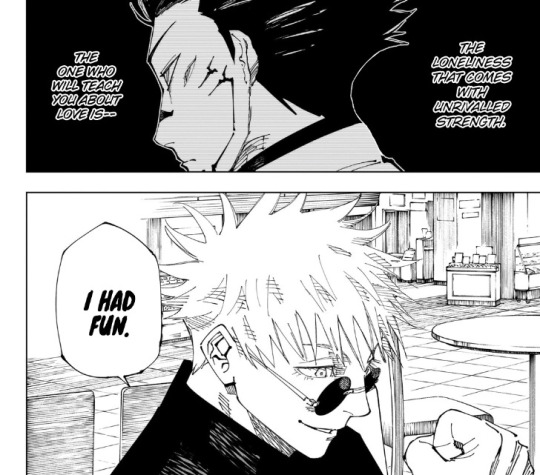
he tries to teach sukuna about love.
^ and THAT’S . the most delicious dynamic ever. i take no criticism. i’ll die on the hill that this concept and their dynamic is one of the absolute highlights of jjk. it’s so GOOD. it’s so insanely good. gojo wants to teach sukuna about love/cure him from his solitude by killing him. and vice versa. it’s inherently violent and inherently tender and it makes me INSANE. to me that’s the greatest appeal of sukugo!!!! violence as tenderness is a trope very near and dear to my heart (and also VERY frequently associated w queer subtext in media…. just putting that out there……) and they do it so good. they have a blast killing each other.
also i just NEED to say how much i love the ”teach you about love” line. it’s one of my favorites in the manga and akutami utilizes it so well!! he repeats it over and over as foreshadowing and to build up the sukugo dynamic. the final reveal that gojo is ”the one who will teach [sukuna] about love” made me weep (even though it was so obvious)…. it’s just so deeply. idk. it just says so much about gojo as a character :(( the fact that he wanted to teach sukuna about love. i’ve seen some people who think that part is ooc but i disagree completely!! gojo has never concerned himself w the morals of others. not really. toji kills riko but gojo still has a respect for him and allows him to say his final words. he never hated geto despite his crimes. he supports yuji fully no matter how many people die because of him. etcetc. same with all his students.
gojo looks at sukuna and sees someone who is just as alone as he is. so deeply, deeply alone. him wanting to change that is not ooc in the slighest because that’s quite literally what drives gojo as a character:
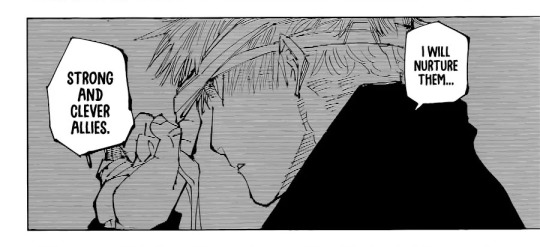

he’s just such a genuinely good person at his core. and it coexists with the way he sometimes disregards morality. this is a hot take but i genuinely think gojo’s character blossomed fully in his battle with sukuna….. i don’t see him as ooc in it at all. he genuinely wanted to reach sukuna!! he knew he was the only one who could even hope to do so. and he tried his best.
and, i would argue that he succeeded.
SEGWAY TIMEEEEEEEEE LET’S GO. okay so let’s talk abt one of my favorite panels in the jjk manga, the panel that solidified sukugo as one of my favorite pairings Of All Time:
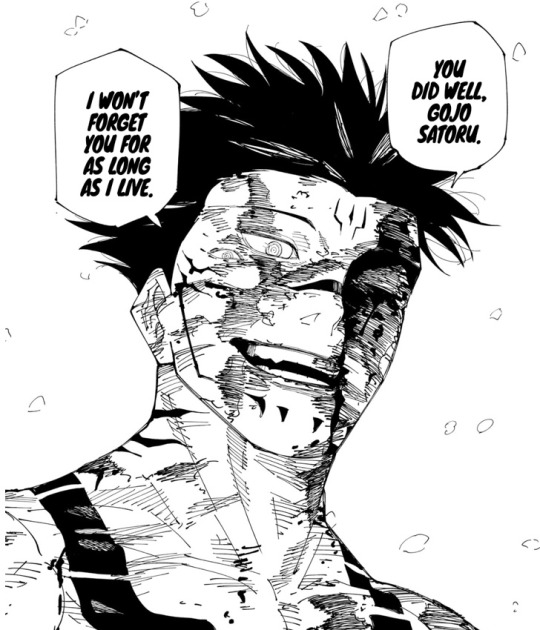

(two diff translations bc i love them both :3)
THIS. wow. wow. wow. i could talk abt this panel alone for hours and hours but i’ll try to be coherent……
there’s just? so much meaning to be found here??? for both of them????? not only is it a fundamental moment for gojo — being praised and acknowledged and accepted as himself rather than the strongest — but it’s also proof that gojo did reach sukuna!!! he’ll remember him forever. sukuna will never fully be entirely isolated because even millenia into the future he’ll still remember gojo. gojo nestled his way into sukuna’s heart.
and that’s just . so romantic isn’t it???? so beautiful???????? this is the culmination of gojo’s efforts; the most genuine expression we’ve ever seen on sukuna’s face. he actually looks happy.
i cried seeing that panel btw 😭😭 not a joke!! i was already crying when i started chapter 236 bc i knew how it’d end but this panel (+ the one w geto cheering gojo on in his cult leader fit) made me SOB. not exaggerating. i’ve never cried so much reading a manga… T_T
so!!!! yeah. i just love sukugo. their dynamic is so interesting and beautiful and i can never get enough of it. sometimes i love it more than stsg… don’t tell geto that though……..

#i also really love the idea of sukuna getting seduced by a lanky gay guy#but that’s besides the matter.#TYSM FOR ASKING ANONNN ILY#i love talking abt these silly guys#i miss them :((((#ask tag ✩#sukugo
52 notes
·
View notes
Text
I just wanna say I really love that queer shows lately have started to cast people who aren't teenagers or in their early 20s. Even in the case of good omens where all the beings are technically eternal so their body is just a vessel, it's still so very refreshing to see queer love and gender non conforming characters that look about middle aged. It's such a nice reminder that queerness is not a trend, it's not new, it's not something only young people are experiencing. I would actually argue that seeing so much queerness in good omens (which by the way was incorporated very beautifully into it, without feeling forced or being made a big deal) makes it even better, because it shows how it has all existed since the beginning of time.
And I also love the actors who are totally alright with playing such roles. Don't get me wrong, they should be fine playing them, that's the bare minimum. But we are now just starting to get the bare minimum in that sense, people not being too insecure to play queer characters, in spite of if they share the same identity with their character or not.
Their age (the actors') is very important to me as well. Because though the younger generation tends to be more accepting, we see constantly a lot of homophobia and transphobia from the previous ones. And we often pin it on their age, "oh they were born in a different time, I don't expect them to understand". Yet there are all these people out there the same age as those you make up excuses for, who understand perfectly. If they can, then so can everyone else, even if they come from a different generation.
Lastly, I love how humane they are finally portraying queer people on the big screen. I love that there can be physical affection and canon events that aren't just subtext, I love that they can show a sexual relationship between two queer people without fetishizing it (because I've seen one too many queer movies hoping for a love story, that turned out to be borderline porn). I love when they don't include traumatic homophobic/transphobic events for every single queer character or don't load them with guilt over their identity. Not that these experiences shouldn't be shown, because a lot of us can relate to them and it's always so nice to be able to relate to a character, feel like someone understands what you're going through. It just gets a tad exhausting when every plotline eventually leads to that.
Generally, I 'm glad they are finally treating us like normal people. Because we are.
#good omens#crowley#aziraphale#aziracrow#crowley x aziraphale#gomens2#ineffable husbands#homophobia#queerness#transphobia
114 notes
·
View notes
Note
Have you ever done a post about wizard school games? If not, any you'd like to recommend?
THEME: Wizard School
Hello there, I have two recommendation posts that you might be interested in: Magic School Mysteries and Magic School. However, I have a few more games that I can talk about in case you haven’t found the right game for you yet!
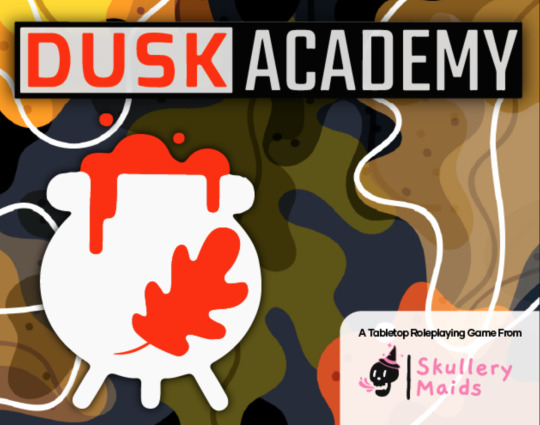
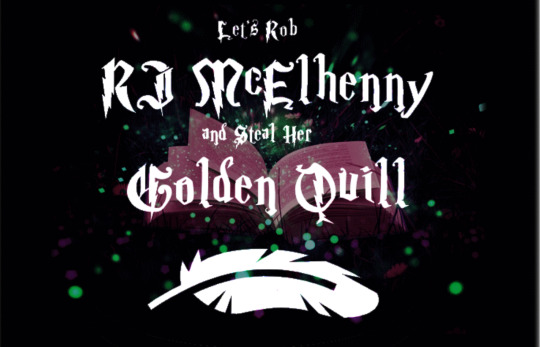
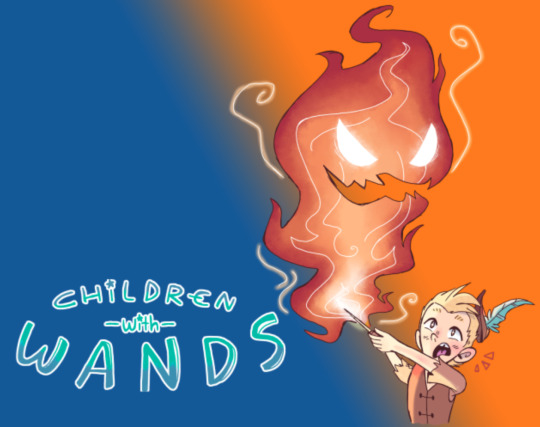

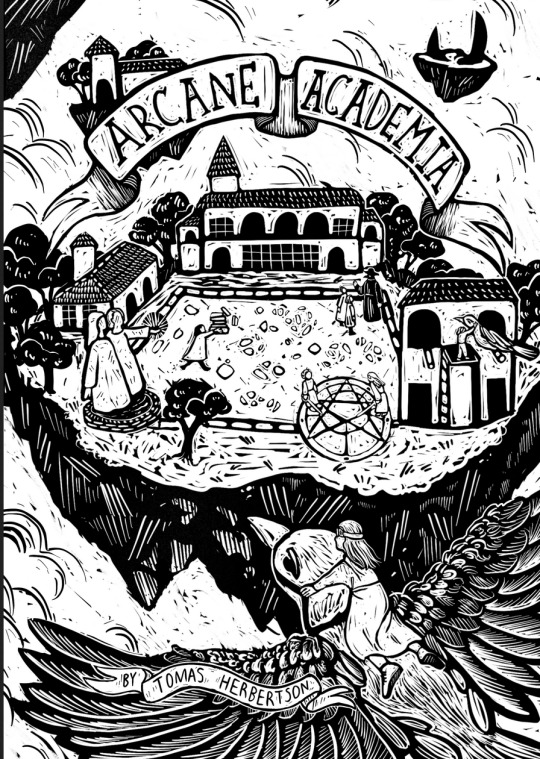
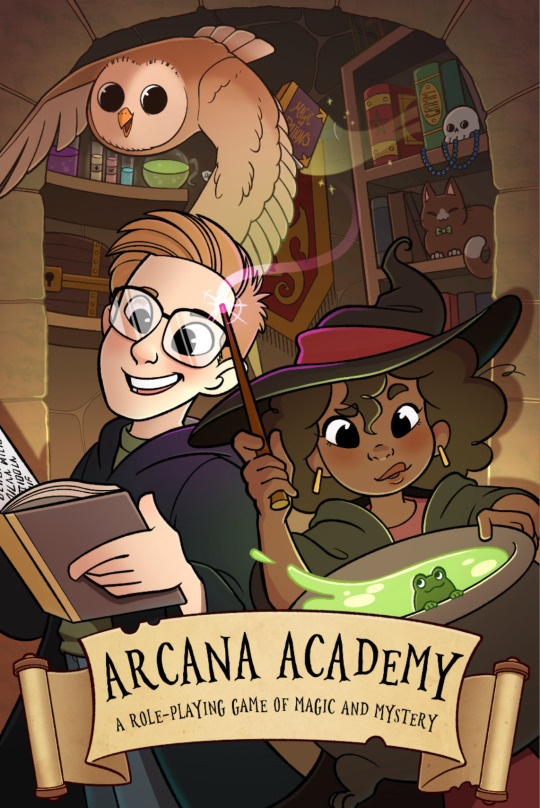
Dusk Academy, by Skullery Maids.
Dusk Academy is a spinoff of Blades in the Dark. It uses much of the same systems and mechanics, deviating slightly to fit the setting.
It is set in the hallowed halls of, well, Dusk Academy — a private school on an English island, far away from society. This school caters to girls fresh out of school, unsure of what to do in their futures. Dusk Academy helps these girls sort out their interests and passions, but it is special in its own way.
The school is home to magic — and teaches it as part of its curriculum. This fact must remain secret from the rest of the world, but the school aims to provide a healthy environment for students to unleash their mystical potential.
If you are at home with Forged in the Dark games, Dusk Academy should be pretty easy to pick up, as it follows a number of hallmarks of the Forged family, including action ratings, playbooks with special abilities, clocks that represent consequences or projects, and Position and Effect. This game also adds something called Zap, which represents energy or strength that is needed to help your characters cast spells.
Characters in Dusk Academy organize themselves into clubs, so the stories you tell will likely revolve around the kinds of things you expect your club to do. Many of these clubs resonate quite closely with the crews of Blades in the Dark, so I don’t think your school experience is meant to be safe or easy; this school may be prestigious, but it looks like you’re destined to be troublemakers while you’re there.
Let’s Rob RJ McElhenny and Steal Her Golden Quill, by Glaive Guisarme Games.
You're a wizard, and don't let anyone tell you any different. Especially not RJ McElhenny. She's just about the richest author on the planet, all thanks to her series of banal, lowest-common-denominator stories about wizards. Stories that make it pretty clear just what sorts of people she believes deserve to be called "wizards." If you weren't born magical, if you needed to learn how to wield the arcane or if your power stems from a patron or charm… well then you're an almost-wizard, as far as RJ McElhenny and her fans are concerned.
Let's Rob RJ McElhenny and Steal Her Golden Quill is about taking on a fantasy novelist because you're tired of the shitty takes she keeps unloading on Twitter. It is, notably, a game with no subtext whatsoever and legally you can't prove otherwise.
Talking about magic schools can put me on edge sometimes because one of the most popular magic schools in media is tied to a lot of real-life bigotry, but that’s certainly not an issue I have with this game. Let’s Rob RJ McElhenny is short and sweet, using a deck of cards to generate obstacles as you move throughout the famous author’s mansion, and dice to help you overcome those obstacles using your elaborate heist-planning skills. This is not really a game about magic school per se, but it is a game about magic users using a lot of familiar references.
Children With Wands, by Joe Kiewra.
Children With Wands is a rules lite, all ages, Table Top Role Playing Game that mostly focuses on having fun adventures where the players solve open ended puzzles and problems. You play as children who have just come into their magic powers and as such don't quite have a grip on their spells yet. This leads to a lot of hijinks where the children often have to fix problems their spells have caused.
Children With Wands is a game currently in beta, so the document isn’t pretty but it’s entirely free. The system is d20-based, with simplified character creation that looks relatively kid-friendly. Much of the dice-rolling relates to the magic that your characters will be attempting to cast - roll too low and you might not get the effect you want, but roll too high and the magic goes out of control. Since your casting is about precision, you’ll use your modifiers to determine an acceptable range of numbers that would grant you success, rather than simply add to your dice roll.
As a document, right now the game is just rules on how to play, no fluff or world description. This means that if you decide to give it a go, you have quite a lot of freedom in determining what kinds of creatures there are and what kinds of problems might be affecting the land around you.
Welcome to Camp Merlin, by KingBim.
Welcome to Camp Merlin - it's time to learn some magic!
Cast spells, befriend monsters, save ghosts, earn badges, prank some fairies and summon goblins, all whilst exploring a magical forest full of ancient enchantments and mystical creatures.
Welcome to Camp Merlin is a tabletop role-playing game about non-magical kids attending a summer camp in preparation for their first year at magic school.
While it’s not exactly a magic school, Camp Merlin is definitely adjacent to one, and it’s got a lot of the pieces you might be looking for : spells, monsters, and a regulated schedule for your (likely) child-aged characters. The tone is meant to be whimsical and light-hearted, and good for short sessions. If you want something lighthearted for your friends with a slightly different setting than your typical magical school, you might want to check out Welcome to Camp Merlin.
Arcane Academia, by Oracle Engine.
A GMless tabletop roleplaying game, in which you play a group of students at a magical academy: companions through the tumults and turmoil of a day in the life of wonder and whimsy. Bond over meals together, attend arcane lessons, socialize during your free time, and go on daring, mischievous escapades at night.
Arcane Academia seems like a great game for replicating school-age hijinx and escapades, and all of the trouble you can get in when you’re supposed to be doing your schoolwork. It might also be a good option for tables who don’t have a dedicated GM in the group. If you want to get a little bit of a taste of what the game is like before you buy it, you can also listen to the episode on Party of One where Jeff Stormer plays it with the designer of the game.
Arcana Academy, by Jordan Palmer.
Arcana Academy is a tabletop role-playing game where you get to play as students attending a magical school. Solve mysteries, get into trouble, learn magic, and forge lasting friendships or bitter rivalries.
If you've ever wished you could attend a magical school like Brakebills, this is the game for you. Players will get creative with spells, wander the halls after dark trying to solve mysteries, and explore a world unlike any they've yet encountered. Arcana Academy uses a light tag based system that lets you choose what's important to the story. Along with the spells you've mastered, your character's personality or talents are what drive the action forward.
Arcana Academy provides a loose framework using the PbtA ruleset, with the expectation that you will want to build a magic school that fits your group’s tastes. Character creation is very descriptive, asking you to write down specific adjectives or phrases that match your character best, rather than choosing an option from a pick list. I think this game is probably better suited for players that already have a very good idea of what kind of school (and students) they want to play, what kind of magic you want to use, and what kind of tone you want to set the story for.
47 notes
·
View notes
Note
hello !!
i was wondering, do you know any other characters like aang from other shows/movies/books? or maybe, just his theme of radical kindness appearing in other stories?
i've been missing aang, and it would be nice to find other representations of such a fun and warm personality like his.
ps.: your blog is like, fantastic. truly.
🥰🥰🥰🥰 This is the best ask I’ve ever received!!! Depictions of radical kindness in media is a special interest of mine—not exaggerating. So I’ve done my best to make a list of rec’s, just tv, from most formally similar to ATLA to least, with a short description for each.
1. Fruits Basket (2019)
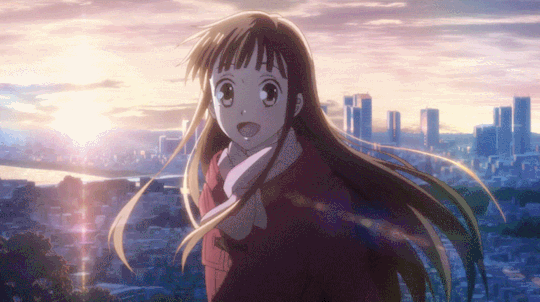
"My mom told me, it's better to trust people than to doubt them. She said that people aren't born with kind hearts. When we're born, all we have are desires for food and material things. Selfish instincts, I guess. But she said that kindness is something that grows inside of each person's body, but it's up to us to nurture that kindness in our hearts. That's why kindness is different for every person."
An anime orphan whose established memory of the kindness by which her family raised her ends up transforming and liberating a whole clan from an intergenerational curse that enforced an abusive hierarchy all within a show that has a deeply queer subtext, beautifully complex plotting and character development that due to its zen influence refuses to demonize anyone or any perspective wholly, AND a straight romance you can actually root for!? Nothing comes closer to ATLA thematically than this show. While the lead Tohru Honda is the biggest representative of radical kindness, the character of Momiji Sohma with his complex purity, idealism, and gender performance is one of the closest you'll find to Aang in any media.
2. Mob Psycho 100 (2016-2023)

"The truth behind one's charm is kindness. Just be a good person, that's all."
Mob Psycho 100 explores a core tenant of ATLA's critique of imperialism and power: greatness and perfection are overrated. They both ask the question about what to do for the world with one's gifts if that's the case. How can one be both normal and prodigious at the same time? The satirical comedy and style of this anime, which deconstruct a lot of the shonen genre tropes, are pretty distinct from ATLA, but when ATLA arrived on the airwaves, it was a pretty massive break from tradition in Western animation, and for both of these series, that difference of style is tied to the message of the show about the experience and acceptance of difference.
3. Natsume's Book of Friends (2012-present)

"As I encountered kindness, I wanted to be kind myself."
The anime, Natsume's Book of Friends and ATLA both depict the challenge and necessity of facing abandonment, loss, and a deep-seated loneliness with kindness and gratitude despite the persistence of grief. Both take a deeply spiritual view--even a responsibility--of this experience that demands a compassion for all beings including those who intend to do harm. Natsume, an orphan shuffled between houses who is one of the few people who can see spirits called youkai, inherits his maligned grandmother's book of yokai names, becoming a target for them in the process. He hides all of this from everyone in his life, and even five season in, still has trouble admitting to the one person who understands him when he is struggling and needs help. The gentle and light tone papers over a profoundly honest representation of attachment trauma and the wisdom of compassion that develops as a tool to cope with it.
4. Hunter x Hunter (2011-2014)
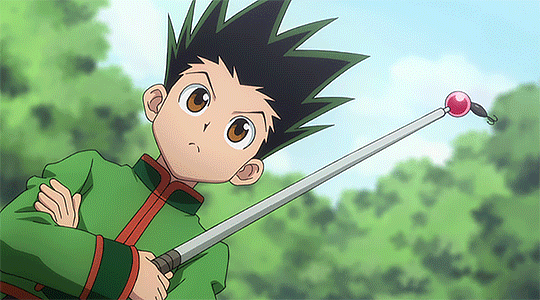
"You can do whatever you want to hide your feeling. You still have a heart."
If you think that "Radical Kindness" is by definition non-violent, then this show is either not for you or going to change your mind. Gon, the protagonist of HxH, like Momiji mentioned in Fruits Basket, is another rare character whose naivete and optimism are treated with respect. He is allowed to suffer, to be wrong, to be stupid, and to inspire others away from their own cynicism with the persistence of his beliefs nevertheless. But HxH is a show that integrates the most violent aspects of the world (organized crime, capitalistic competition and privileging, state-sanctioned brutality, pure sadism) with its examination of human potential for goodness. And even within a list of shows deeply inspired by spirituality and religions, this show is abundant with religious references as it seeks out meaning, balance, and an ethic for modern experience. On top of that, it ranks with ATLA for the depth and relevance of its magic system to its themes, plus its got gay subtext out the wazoo!
5. Mushishi (2005-2014)

“Make sure to remember, every person and place has a right to exist. It is true for you too, the entire world, as a whole, is your home."
Elegaic, episodic, compassionate, and strange, with some of the best short story-telling of all time, Mushishi is the story of a medicine-man who travels the Japanese countryside helping people deal with the spirits that accompany the little trials and tragedies of life that cling to our minds long after they're passed. The protagonist, Gingko, and the show itself takes the approach of restraint to observe these problems fully and come to a conclusion that's taoist in its balance and acceptance of reality--"Eyes unclouded by hate" as Miyazaki/Gaiman would have it. Each episode is like a therapy session arguing for you to choose to live even as the heaviest burdens sit on your chest.
6. Reservation Dogs (2021-2023)
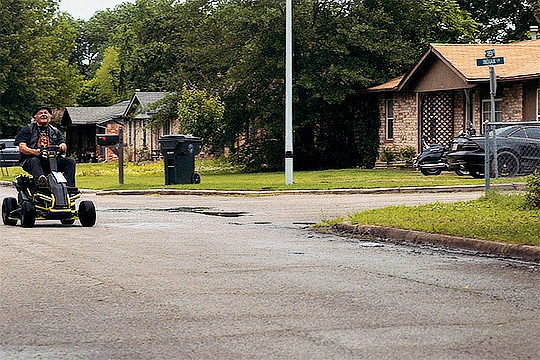
"See...love doesn't have to be received, it can just be."
We're finally out of the animes, and moving away from the zen and shinto approach into some other options. Reservation Dogs' indigenous humanism was groundbreaking, bringing in distinctly modern American realities (with the kind of true-to-life details only a an on-location shoot could offer) with Native beliefs about ancestry, community, and connection to the land, while rarely feeling preachy. Instead, it's just fucking hilarious and casually heartbreaking. Four friends on the edge of graduating high school on a reservation in Oklahoma try to figure out what to do with their lives after their plans to go to California get abruptly messed up. Radical kindness as a concept often gets focused on accepting the enemy but what about accepting the weird stoner uncle who farts all the time and won't talk about his years in the army. I think that might be a more important goal of radical kindness, in truth, if we are being asked to look and accept reality for what it is, because growing comfortable with disappointment and the mundane let's us live without the relentless striving that drives perfectionism.
7. Skam (2015-2017)
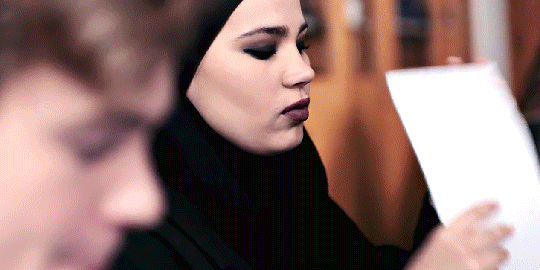
"The second you start looking for hate, you find it. And when you find hate, you start hating."
A Norwegian teen drama that understood internet culture better than any show before or since, four season-long romance plots better than any romance film from that decade, and a masterfully constructed exhortation about leaning into failures of connection to build deeper compassion rather than demonize another person or group. Each season focused on a specific character within a high-school friend group, emphasizing the limited scope of subjective experience, and had them confront the challenges of opening up to others fully. And even when they return into the scenes with new protagonists, their lives weren't sorted perfectly, reflecting how resolving a single romantic plot point would not resolve life. The impact of this low-budget public-television web series (!!!) will be felt for years (it's already been referenced by Netflix juggernauts like Sex Education and Young Royals), but we're not likely to see something that juggles political themes, heartfelt characterization, realistic dialogue, and meta-commentary (it flashed its own hater and fan comments across the screen in the last episode!!) in such a obsession-inducing package anytime soon.
7. Boys Like Boys (2023)
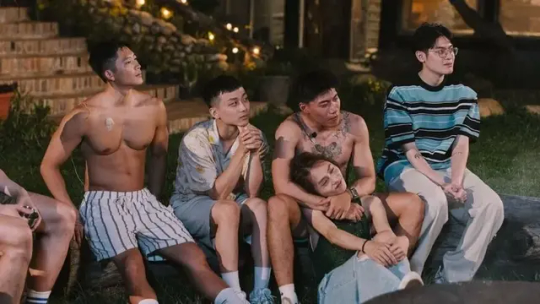
"Because I have always been someone who hates myself, I don't have the courage to face it. Running away is my only option...What if I give myself one more chance to be brave?"
So how can a reality show make it onto a list of radically kind tv series, especially a dating show!? Well, when that reality dating show casts people who radiate warmth, vulnerability, and respect and seem to have the kind of chemistry that most scripted shows can't even manage, it's a good start. But then, when they elevate that cast with a format that addresses the cruelty of dating, elimination formats, and broader societal exclusion (an important consideration for a gay dating show), it offers a new model for future shows. Boys Like Boys did this when mid-season (spoiler alert) they had contestants vote out a contestant, only to provide the contestants with a vote in which they could retain a contestant who they didn't want to leave. In fact, many of the contestants asked if they could abstain from making a vote that would eliminate a constestant and were allowed to. The final result left one contestant, Jia-Hang, up for elimination--he had voted for himself to be eliminated, and many contestants, recognizing his reticence to continue on the program, didn't want to force him against his will to stay. Then, looking around at nearly the whole cast sobbing, even apologizing to him for not providing him enough support, Jia-Hang chooses to stay on. This is just one of many heart-warming authentic moments in the show that illustrate the vital influence of kindness to impact the trajectory of our hearts.
8. Joe Pera Talks With You (2018-2021)
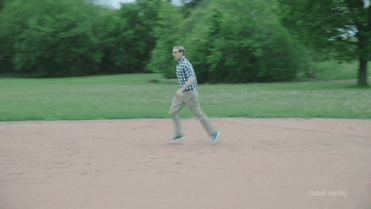
"I can help you reach things. I can tend the garden. The different hours we keep are a good thing. And when they overlap, I can offer companionship and entertainment."
So much has been written about this show's groundbreaking kind approach, I'm going to quote instead: "It can be difficult to convey how a TV show airing on Cartoon Network’s provocative nighttime programming block Adult Swim can evoke almost nostalgic feelings of kind-heartedness. The premise of Joe Pera Talks With You is so simple as to almost be beside the point: Comedian Joe Pera plays a lightly fictionalized version of himself as a sweet Michigander, a middle-school chorus teacher with small and specific passions. Joe likes breakfast food, obscure trivia, beans, trips to the grocery store, and his grandma. He greets every day with a contented smile, stands beneath a pale blue sky, packs a balanced lunch that contains no surprises. (A turkey sandwich with cheese and a tomato, a banana, some trail mix, and as a treat, some cookies.) Joe, more than anything, is satisfied. His greatest joy is sharing these small pleasures with you, the viewer who exists on the other side of the fourth wall he has cleanly dismantled, often speaking quietly to the camera like he’s sharing a secret, just between you two. That he’s talking “with” and not “to” you is a crucial distinction in the show’s title: Joe never lectures nor rhapsodizes. Instead, he waxes poetic about what he loves and who he cares for and how he leads his life, telling his stories from a vulnerable position of welcoming you into his daily existence.” --“A Great Comedy About Being Good,” Allegra Frank for Vox
9. Anne with an E (2017-2019)

"Her life was not short on challenges, and still she held no grudges, believing instead that grace is perennial like the green, green grass."
While maligned for not being the 1980s version, this Netflix adaptation of Anne of Green Gables takes what many have read as an autistic subtext and made it text, giving Anne a performative quality that pushes a lot of the audience into the same irritation that the characters of Avonlea feel for Anne at first, and, thus, requires its audience to persevere toward the same kindness that Anne inspires in her adoptive mother figure, Marilla, among others, which is much more rewarding than simply identifying with Anne right away. In so doing, it enhances the development of its broader approach to acceptance--an approach in its insistence on the requirement of a community of kindredness (see Sebastian's excitement at finding out about the black community in "The Bog") that is much more rigorous than many other shows will cop to. Expanding far beyond literal adaptation into queer, black, and indigenous characters, without disguising history or disparaging the thematic seed of grace at the heart of the novels, Anne with an E imagines what it meant and what it might still mean to build real joyful community with others through kindness.
10. Little Bear (1995-2003)

"Interesting."
A childhood favorite that disguised in its simplicity a wide-openness to the world and an acceptance of different natures. While most child shows emphasize kindness, few do so with as much patience, wonder, and generosity extended to its viewers. Little Bear is a curious kid who goes on adventures in the woods around his house that can turn into games or small imagined experiences. He is sometimes with his friends Cat, Duck, Hen, Owl, and Emily, whose personalities, along with Little Bear's, bring about small tensions in their games that ultimately resolve, if not independently, then with the help of Mother Bear or Father Bear, who give each other knowing glances about the expected childhood behaviors. This is the first show that initially taught me to observe things while withholding my judgment, that first step of radical kindness.
12. The Andy Griffith Show (1960-1968)
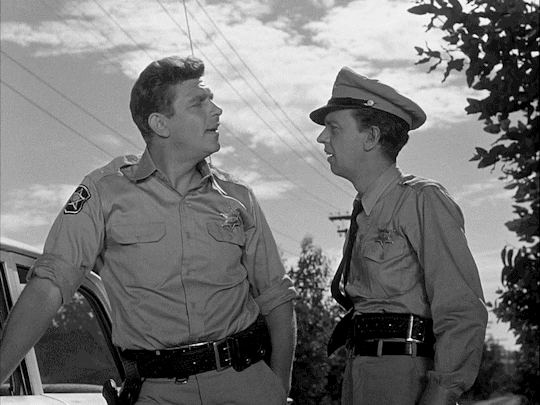
"The key to happiness is finding joy in the simple things."
One really old and somewhat controversial throwback for my last entry. If you have concerns about a sheriff character representing radical kindness, I would encourage you to start with the third episode of season 3 where Andy, the sheriff in question, has to explain to the new mayor why he doesn't carry a gun and lets prisoners go to gather their crops. There have been some fantastic pieces written about the complexities of this show's bucolic fantasy and Southerners (of all races) attachment to it, but they all acknowledge a type of humanistic and deceptively simple virtue found in Mayberry that audiences long to witness, if not emulate themselves. It's a morality that resists the "hyperactive zealotry" and bureaucracy that the show satirizes through Barney Fife (along with guest characters like the new mayor) and instead emphasizes the understanding that one can have for each individual and the trickstery middle paths that one can find to address conflict.
#sorry this took so long to respond to!#honorable mentions include Hey Arnold! & The Good Place & Friday Night Lights & S1 of Ted Lasso (but only S1 lol)#atla#kindness prevails#likealittleheartbreat recommends#fruits basket#mushishi#natsume yuujinchou#hxh#andy griffith#joe pera talks with you#reservation dogs#little bear#skam#awae#boys like boys#mp100
36 notes
·
View notes
Text
I always make the mistake of looking at the comments when I watch compilations of Soren’s cameos in Engage because inevitably, I always come across Those People who are sole-minded in their determination that Ike and Soren are Not Gay and somehow feel the need to argue this in every part of the internet where ikesoren shippers might gather.
And it’s just always an instant mood killer.
It also just… confuses me. Like, okay, I can understand why someone might be adamant that Ike is straight. I think they’re wrong, but I understand the mindset. Ike keeps his emotions close to his chest. He’s stoic and beefy, a stereotypical red-blooded manly man.
I don’t think they’re correct. I think there is plenty of subtext (and like, actual text) that validates the idea that Ike is, at the very least, some shade of queer.
But Soren? I feel like anyone who argues that Soren is straight must be either lying or have no clue what they’re talking about.
For one, the way he talks to and about Ike leaves little room for doubt. Ike’s place is where he belongs. Ike is special to him. Serving Ike gives him purpose. He doesn’t care if all the cities burn and the seas swallow the earth, so long as Ike survives. So on and so forth.
There’s also the literary parallels in Ena and Rajaion’s relationship in the first game, and Micaiah and Sothe’s relationship in the next, both canonically romantic pairings.
But I feel like even Soren’s character arc is a metaphor for the queer experience. He grows up suspecting that there is something different about him, something that causes the beast laguz of Gallia to ignore him, to be unsettled by his mere existence, to give him the impression he would be better off never having been born. And in early adolescence, he again notices something off about himself, things that set him apart from his peers.
Then, still within his adolescence, he figures it out. He learns a key part of his identity, something that he cannot change, something that marks him as sinful, a physical embodiment of a religious taboo.
If his secret gets out, Soren risks rejection. And so he is desperate to keep it secret, to pretend to be “normal,” to deny anyone who insinuates that he might be just like them. His fear is so great that, when Nasir threatens to effectively out Soren to Ike, Soren stops questioning Nasir, fearing Ike’s reaction more than the potential of having a traitor in their midst.
Then, in Ike and Soren’s A support, Soren finally reveals his secret, fully expecting it to be the end of their friendship. Instead, Soren finds immediate acceptance. Because it doesn’t matter, not really. This aspect of Soren doesn’t change the core of his character. It’s part of who he is, but it’s not who he is.
Is it not a clear metaphor for being gay?
Gosh I love Soren so much. A+ character. I just wish there were less people who were so dedicated to misunderstanding him.
107 notes
·
View notes
Text
I know people in HMC books speak English so there's not gonna be any kind of miscommunication between the characters, but sometimes I think about how it would be way more funny If there was some language diversity.
Howell Jenkins falls into the portal to an absolutely unknown, magical realm and... everyone speaks English. He was rather happy about it, finding it funny: it's a new, fantasy, fairy-tale based world with dragons and spells and seven-league boots and magic, and yet its habitants English. What are the odds?
However, it does not takes him long to realise (much to his own frustration) that, even though all of the locals native language is, in fact, English, it is pretty different from the English Howell himself is familiar with. He cant understand it quite well at fist, but it sounded like an odd mix of a modern language, specific dialects and an old tongue people was using around Victorian England/Middle Ages. It has so many words and unusual forms (Howell even called them "slang" once in a while), that it takes him a while to fully get every term and subtexts ms. Pentstemmon was referring to.
Their languages were similar just enough to catch the full sense of the sentence, but not enough to undertand all the little details, not cultural nor linguistic. It would even worst If he wasn't a big fun of Shakespeare and old Arthurian Legends growing up, letting alone studying old English (and old Welsh) at the university.
The language also differs from the area. Michael, for example, uses so many words you can hear in Porthaven only, regarding it's unique aspects. Sophie uses a lot of Market Chipping proverbs, and even more old terms connected with hats. The language he heard the King using wheh he got his first chance to met him at the time of his apprenticeship was so long, confusing and vivid, as If it was taken straight out of old English Literature books. And yet, English.
To this day Howell — at this point long-knowing as Howl Pendragon — finds himself confusing new terms, forms of words, proverbs and sayings. Maybe, he thinks, you have to be truly born there to understand all of - although he did better than anyone else would. Sophie seems to catching up just well.
—
Abdullah ends up with a flying carpet and the magical genie, exited to give away his fist wish to find the love of his love... only to not understand a word of what the genie is saying. This is how, instead of searching for Flower-In-The-Night, he now searching through a whole Zanzib for a proper translator from English because, here's the problem, If he can't understand the genie, then genie can't understand him, and If genie can't understand him, it's pointless to even try making a wish. He knows it's English: there's plenty people all around the world visiting the market, and he had even learnt certain words, important for making a trade, but that's not nearly close to a full sentence on unrelated topic.
With a great effort and after hours of searching for a really proffecional master of languages (who charges Abdullah nearly all of his money for one single session), he finally gets to the point. Except, here's another moment. That's where Abdullah finds out the wish has to be spoken from his heart and not through the other person. Here comes another catch — Ingarian English, no matter how simple or structured is, to put is simply, badly different from Rapshutian Arabic. It's not even the same language group!
So, he sits in the small, hot room near the glamorous bottle and tries to pronounce a bunch of difficult, complex words written on a paper, the kind that translator couldn't cut or simplify to ones he's familiar with, for a whole ten (to fifteen) minutes. And, as If trying to make his task as difficult as possible, genie, when he shows up, starts randomly breaking into the language translator can't even recognise, with no talk about understanding. Abdullah assumes it may be a secret genie language only this creatures know and, annoyingly, gets along with it.
After successfully wishing to understand (and use) English, he also finds out he can't wish for anything more language-related, and he shouldn't even bother himself trying to ask for a foolish things like an ability to speak every language in the world. Language is a big part of human's essence and otherwise shouldn't be messing with, just as magic focusing on it is strictly limited.
Using this fact, the genie also finds a loophole - from now on he speaks his secret genie language half of the time, stopping only when it comes to important tasks, because Abdullah "wished to know only one of his languages" and he, apparently, knows more.
This whole puzzle takes new turns, when, while traveling with the carpet, Abdullah meets the solider. Despite claiming being from Strangia, this strange man from the forest starts speaking with them in English in first and then, noticing they're from different country, easily switches to Arabic.
As they wander together, the soliders explains that he is non less confused than they are: he didn't even noticed he could speak English before the passer-byes from Ingary noticed him, and now, being with genie and Abdullah, he also remembered he knows Arabic. He adds that he can't recall anything before his duty in the army, where he definitely used Stangian and nothing else, but it feels like an strong knowledge he has, even If he doesn't remember learning any of this. He decides to wave it off, focusing on the cats and schemes.
The solider becomes a great translator for them along the journey, up to the day the got the inn. He does not understand the secret genie language, though. Especially when from the jinnies and angels they found out there's, in fact, no such a thing as a "genie language"
The story finally clears itself when Midnight and Whippersnapper turn into humans, the Solider turns into a bewitched Prince and the Royal Wizard surprisingly seems to recognize all of the words the genie was — and still is — using.
—
Charmain runs after Sophie with a long, old dictionary she has found in the Great Uncle Norland's Library. The Royals, of course, gave their honored guest the translator, but the things quickly becomes pretty private, with the search for the gold and all this story with lubboks, so Sophie tells them she's gonna manage it by herself.
To say the Dictionary is heavy is to say nothing: it's huge and thick, containing thousands of words from Ingarian English alone, split by topics, marked with tons of colors an additional moments. Even carrying it around is a whole different type of task.
Half of the time Charmain and Sophie communicate with gestures, context clues and even sounds. When they need to say something really long and complex, they write, leaning on the Dictionary, as it's a bit faster than talking. Still, at some moments Charmain has to flip through the massive pages, searching for the right word with her finger, while Sophie has to do the same. Till the end of the day the both learn some basic words from each other's language, which makes it easier.
The poor nanny has even harder times with Twinkle and Morgan, because she has no idea about what they actually want, except they both whining and crying, one louder than another.
Translator does not come in handy that much, as it looks like these children mix languages everytime when speaking to each other. She has to guess things all over the room to finally get what they need, and usually it's the most useless things ever, like striped pants and a bunch of toy horses falling from the sky.
They see Sophie and Twinkle arguing about something, but no one gets the topic of their screaming, let alone the reason why Sophie is so mad at this angelic child. Charmain asks Sophie about it, because she heard an unusual name along the lines of their quarrels, but Sophie looks too annoyed to explain, mumbling something in her native language with some sort of anger.
The only positive side of it all is that, If Chairman can't understand English, then the lubbocks can't either. Wich means that they didn't have to be as cautious when using Dictionary as they would have to If they understood each other perfectly.
Then she has to climb on the roof, where Twinkle is sitting. Charmain tries to dismiss all his attempts to start a dialogue till she's there, huffing and suffocating as she tries to get the Dictionary with her, trying not to fall.
Twinkle seems to be really proud of himself, saying he knows twice more languages that anyone else in this magical House. Charmain flips through the pages, asking either one of is the one she knows (Norlandian, I assume).
Twinkle says no. For a second Charmaine starts to really understand Sophie's feeling, fighting the urge to hit him on the head with this massive book.
Peter does not communicate with this new guest as much and, luckily, he knows the language Charmain speaks, so they don't have to struggle with a language barrier. The way speaks might be a bit different because of the area he grew up and the amount of hiding and spells he encountered, but there's nothing they can't handle. Luckily.
Calcifer knows the Saucepan song, but other than that his linguistic knowledge is far from perfect, certainly not as good as you'd expect from a fire demon. He also cannot use a Dictionary, because it will burn the second he'll come to close to it, and If this happens their main way of communication is basically gone. He makes up for it, talking with Twinkle, Morgan and Sophie, as well as being expressive enough to understand the basics or what he feels and plans. Sometimes someone (aka Sophie) has to translate what he is saying when she's near, wich is a bit longer than Charmain would wish, but still pretty plausible. She got that he desperately needs his logs, after all.
Twinkle could have used some kind of magical bubble to get them finally understand each other fully, but, again, magic connected with languages is pretty difficult and has its important limits, so it wouldn't last long. Little 30 years old boy is enjoying his childhood, running up the stairs and beating these huge bugs, not as much caring about Charmain all this huge book in her hands.
In the end, (as he turnds out to be) the Royal Wizard Howl is right - the only languages lubbocks can understand is punching.
(Many thanks to my rly good friend @your-queen-shuri for being co-author of this concept. A bunch of ideas here are from her!)
#ALSO THINK ABOUT WHAT CHAOS THERE WOULD BE ALONG THE PRINCESSES#like they're really educated so (same with Justin) probably know a lot of languages BUT#they will need a time to understand who speaks wich and who knows which better#also there's definitely a term of “foreign language”as Sophie used it when Howl was speaking Welsh with Mari#and the Asian princess (poor soul was written so wrong) does have an accent#AND YET#all of the protagonist speaks English without a problem#wich is pretty unrealistic as all of them come from different social status#they can't possibly all know English to C2#wich is#it's not making books wose by any cjay#they stole my soul#BUT#I love thinking about the concept#imagine how different the language would evolve because of Fairly Tale norms#like sayings and proverbs#like “just as an eldest daughter” = unlucky#etc#howl pendragon#sophie hatter#howell jenkins#howl's moving castle#hmc#howl's moving castle book#hmc book#castle in the air#house of many ways
17 notes
·
View notes
Text
Theory: Sigma's Identity is Lev Tolstoi
Decay of the Angels is a organization, equivalent of Russian literature in Bsd. There is something in the subtext that has been puzzling me since the first moment I saw Fyodor and Nikolai together.
Where is Lev Tolstoi in the BSD universe?
I thought for the first tims hat he would not be on the same side as Fyodor and Nikolai because of differences in philosophy and ideas, or that he would start on the same side and leave, etc. I was thinking about it, but Tolstoy did not appear in the story. So of coudse theory came to my mind.
Sigma, who is we don't know he's full identity" is actually Lev Tolstoi
I will explain everything in detail and at the end of these short paragraphs you will understand the logic of the theory. Now, I saw an idea at @bungoustraydogs-tr was written in just one sentence:
Sigma might be represent one of the building blocks of Russian literature, Gorky or Tolstoy.
is it possible ?
I think: (Drum voices)
He could be
Let's dive to the point. With his own words and writing, Lev Tolstoi is constantly searching for something that can be called internal and tries to understand his own self, why he is alive, what is being a god etc. He explains that he is trying to understand. He thinks day and night to prove to himself how the value of life is determined and the existence of the God he actually believes in. He is similar to Sigma, who does not remember his memories, does not actually have a sense of self, and therefore tries to understand the world he thinks he lives in. Tolstoy's sense of self was also undeveloped. At the same time, Sigma existed in the middle of nowhere, meaning he had no choice but to seek values, vitality, and purpose. He thought he had to follow the path given to him. To follow the path promised to him. Rules made by destiny , well, sound familiar to someone also to someone's characters . Tolstoi
At the same time;
"The view that knowledge acquired through reason leads to error helped me to save myself from the wrong path of indulging in unproductive thoughts. The certainty that knowledge of truth can only be found through life called me to doubt the correctness of my life. Despite everything, I was looking for God, I was hoping to find Him, and I was directing a prayer to the God I was looking for and couldn't find, as was the old custom. Sometimes I was weighing and measuring Kant's and Schopenhauer's facts about the unprovability of God's existence in my mind, and sometimes I was trying to refute these facts."
These are the sentences coming from Lev Tolstoi's own mouth.
Second thought for the theory;
When Sigma was born in the middle of nowhere, he had a ticket for a train that wasn't in the desert.Simple. Anna Karenina. Anna Karenina is a book that begins with children playing with trains, and the train has an importance that cannot be hidden in terms of the plot. Even though I haven't personally read it, I researched that trains were important to the book.
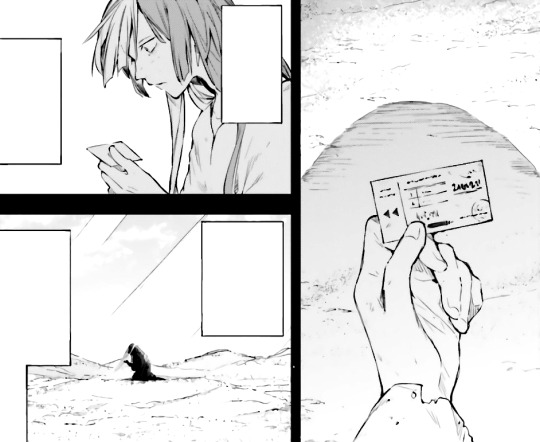
Second thought for theory;
When Sigma was born in the middle of nowhere, he had a ticket to take a train that wasn't in the desert. Simple. Anna Karenina. Anna Karenina is a book that begins with children playing with trains, and the train has an importance that cannot be hidden in terms of the plot. Although I haven't personally read it, I researched that trains were important to the book.
Thirdly, while thinking about religion and morality, Tolstoy, like most people, thought that the world in which a religious person lives was not the most important fact. He had no ambition, but he took good care of himself because he valued life. Sigma voided a gamble at Sky Casino, giving its customer a second chance. Sky Casino was life for Sigma and he nullified one of the game his customer play so Sigma think games aren't important as his customers views. In fact, the search for talent emerged in parallel with acquiring knowledge.
I can believe Asagiri doesn't want t add Tolstoy but after all the authors reveal in story.... Also Sigma isn't count as a villiain after all and Lev Tolstoi really want to see himself as a better person, this is kinda a obsession to him. So, this theory might make sense
#lev tolstoi#bungou stray dogs#bsd#bsd theory#bsd analysis#nikolai gogol#fyodor dostoyevsky bsd#sigma bsd#anna karenina
33 notes
·
View notes
Text
TC tag game
Thank you for the questions and for tagging me @renaultphile
Rules: Answer the questions and tag other TC fans
"He would not fucking say that" only they did and it's canon. When/who?
I don’t think I’ve read it enough to have a sense of something like this. I really disliked Laurie’s scenes with Adrian though. So it’s not so much ‘he wouldn’t say that’ as ‘I would prefer to ignore the fact that he said/did that.'
2. Did they kiss in the study? Yes/no + why you are 100% correct about this.
I think they did. The first time I read it, I didn't really wonder if something had happened, only what had happened: I didn’t know if they’d only kissed or done anything more. Later, it seemed to be confirmed by Ralph’s letter that they’d not done ‘anything more,’ I just assumed it was a kiss, and I don’t really think the dialogue following the ellipses makes much sense without anything having happened. “Now you see what I mean, Spud. It would never have done, would it? Well, goodbye.” What could Laurie have seen if there was nothing besides a hug or handshake or something? What would never have done? Why ask him to ‘come here’ at all?
3. Mandatory question about Ralph's alleged tattoos.
I really don’t think he’d have any, but if he did I think it'd probably be something nautical.
4. 53 vs 59 edition: quote a line or paragraph that is better in the edition you like the least.
I don’t know which of them I read and I definitely haven’t read another addition, so I can’t answer this. Apparently, the earlier one had more detail and dialogue, so if I haven’t I’d love to read it
5. Which TC character would feel right at home here on tumblr dot com?
Sandy, I think he'd be great on here.
6. Tag yourself at Alec's birthday party.
Laurie reading a book or Laurie just at the beginning, sitting around awkwardly, listening to people’s conversations and wondering how on earth he ended up there.
7. Post a TC meme
The first I ever saw (on the Mary Renault tag) and still the funniest to me, I think because I understand it perfectly
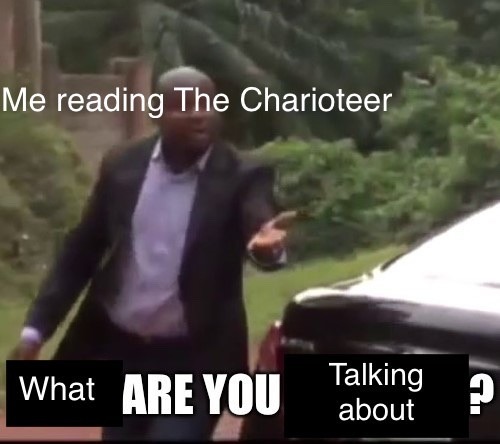
8. Easy to talk about who deserved better. Who deserved worse?
Straike, I hate him with a fiery passion. The man had a dog put down, not because he was sick or anything but simply because he couldn’t be bothered to care for him. Vicar? Ridiculous.
9. You can break the fourth wall (at any point in the novel) and say a single sentence to our protagonist, Laurie Odell. What do you say?
'This is not Ancient Greece, stop being weird,' at the exact moment Andrew is telling him his traumatic life-story and Laurie is preoccupied worrying about Dave.
Also related to the question, but not really asked for: if I could I’d also tell Andrew he doesn’t have to feel ashamed of how he feels about Laurie. Well, more accurately, I’d give him a modern copy of ‘Quaker Faith & Practice’ and have the relevant passages highlighted, so I know he won’t miss them. It makes me very sad for both Andrew and Dave that their whole lives could've been very different (and much happier) if they were born four or five generations later.
9. What's a question you have about TC? One you haven't found an answer for yet.
I can't think of any, besides wondering how Mary Renault could've written it because it's so good. I love the use of subtext, the way she describes emotions you've felt before but never would've been able to put into words on your own. In terms of characters and story, I do have a random question about Bunny: was it supposed to be implied that he was a perpetrator of sexual assault? I got that idea when I was reading the car scene between him and Laurie but I was unsure.
I don't know who to tag! I think all of the Charioteer accounts I know have already been tagged, but if anyone hasn't and wants to, I'd love to read your response!
17 notes
·
View notes
Text
After finishing my full rewatch, I've expanded the number of times Ed uses sea/water based analogies and metaphors to refer to himself and all the moments involving sea/shorelines and the liminality they represent.
“treading water, waiting to drown” (1x04)
“Be a lighthouse” / “cracking up on the rocks” (1x04)
throwing unwanted people/hopes/dreams/fears into the sea (1x05, 1x10, 2x02, 2x03, 2x07)
the dock and lighthouse in his flashback to his father’s death - the first sea versus land metaphor, where the horror rises from beneath the surface (1x06)
“something stirring in the brine” (1x06)
“plumb the depths” / sirens and krakens (1x06) being the thing to trigger a breakdown
extensive beach scenes as a division point between Stede and Ed thanks to Calico Jack (1x08)
“Edward Teach, born on a beach” (1x09)
the kiss happening on the shoreline (1x09)
the abandonment happening on a dock (1x09)
marooning the crew on a sandbar - a temporary island, which is what Stede and his crew were for him (1x10)
“sunshine one moment, cataracts the next” (2x02)
his purgatory begins with him waking at the high tideline - a symbolic meeting point between the land and the sea (2x03)
collecting paua on the beach with food and baskets with ties back to his mother (2x03)
“Jeff’s Inn by the Sea” - another place on the edge of land and sea (2x03)
reveal about the Gravy Basket while standing on the shore (2x03)
becoming the cataract - the chaotic surge falling over a cliff and full submersion in the sea as a way to end his life (2x03)
mer!Stede - a creature of both land and sea who can be there with him when he’s in his dark watery doom (2x03)
“caught in his whirlpool” (2x04)
“hanging out on this ladder” - again somewhere between the sea and the safety of the safe space ship (2x05)
“Man against beast - I’m the man and the beast was beneath the sea” (2x05)
“we’re the fish, I think” (2x05)
“storm’s coming but I just can’t see it” tied in with flashbacks and a shot with a 50-50 split of sky and sea (2x06)
another abandonment that is planned on the dock by the water’s edge (2x07)
“pirates and fishermen are nothing alike” - subtext of the entire conversation ties to “you can’t catch the fish unless the fish chooses to be caught” (2x05) and Ed is choosing not to be caught and fleeing (2x07)
the opening of 2x08 on the water’s edge, away from the sea
"I used to view the sea as a battlefield but now I can appreciate the bounty it has to offer" (2x08)
"no better than a heron, or a blade of grass, or sand or... like a wave or something" (2x08)
reclaiming an identity cast into the sea (2x08)
rising from the waves on the shoreline, a place where he becomes himself instead of trying to split himself into different sides - Edward Teach, reborn on a beach (2x08)
finding one another on a beach (2x08)
choosing to leave the sea and make a home on the line where the land meets the sea (2x08)
14 notes
·
View notes
Text
what is the real hidden message of frozen 2′s “show yourself”?
so i got the inspiration earlier to finally rewatch that frozen 2 “show yourself” music video on youtube, and i had some thoughts in the middle of doing so.
as a disclaimer, i just want to say that i’m absolutely queer myself. this is not to discredit others’ interpretations of the song, and this is just my own take regarding my life experiences. i’m not claiming to speak for everyone in this post. in fact, i do still believe queerness has a lot to do with the subtext inside of the lyrics.
but anyway, i remember when the movie was in theaters at the end of 2019 and there were plenty of articles written about how “show yourself” has a hidden meaning about accepting the idea of being queer. there are lots of people my age who were new to identifying as lesbian, gay, bi, and/or trans at the time and i thought it made a lot of sense, especially because the headcanon and theory that elsa is a closeted lesbian was so popular at the time. it paved the way to shipping elsa + honeymaren (elsamaren) and made it easy to read frozen 2′s ending with them dating.
and that’s definitely notable ─ i’m not disagreeing!
but something always felt off about how i related to the lyrics personally and i was never sure why.
until i stumbled upon it again today.
in my opinion, i think the song is better heard with autism (or otherwise neurodivergency) in mind. it tells my story of finding the missing piece much better than it does of my realizing that i’m bi + trans, as well as my coming out.
again, i don’t think the LGBTQ+ reading is wrong! honestly i believe it comes down to a mix of both that and the autistic reading. but i see the latter outweighing the former here.
to me, i looked up these lyrics on google and my mind went straight to getting a diagnosis, an answer as to why my social life has always been so wrong:
i've never felt so certain
all my life i've been torn
but i'm here for a reason
could it be the reason i was born?
i have always been so different
normal rules did not apply
is this the day?
are you the way
i finally find out why?
everyone has something different to say about what part of their identity has impacted their experiences the most growing up. for me, it’s being neurodivergent. my sexuality, probably like most people (but of course not for many others), didn’t show up until my teenage years; same with my internal gender and outer presentation. my autism, however, has been present and influenced who i am for my whole life. i felt elsa’s longing and determination to find answers to her lifelong questions about not just who, but how & why she is in her musical journey throughout the ice caves.
i feel like we can all say confidently that who we are, regarding being queer, is something we can answer with the factual statement that we are queer and that’s just that, unless of course we get into the old debate regarding if it exists as nature vs. nurture. regardless, it’s always innate to some degree, and doesn’t inherently determine our personalities, behaviors, or understandings. autism & ADHD both do; it’s literally what defines autism as we know it.
that’s my argument. as i said, i’m not looking to “prove” anything or present my subjective opinion as objective fact. my take isn’t that the neurodivergent interpretation is more important or valid than the queer interpretation, just that i prefer the second option over the first.
either way, elsa is, without a doubt, an autistic sapphic! this is (part of) what makes her a valuable, relatable character to a lot of young people and we should always celebrate that. ♡
#disney frozen#frozen#frozen 2#disney elsa#elsa frozen#elsa#autistic elsa#elsa lesbian#frozen show yourself#show yourself#frozen analysis#actually autistic#actuallyautistic#actually autism#actuallyautism#growing up autistic#autism diagnosis#autistic girls#autistic women#elsamaren
52 notes
·
View notes